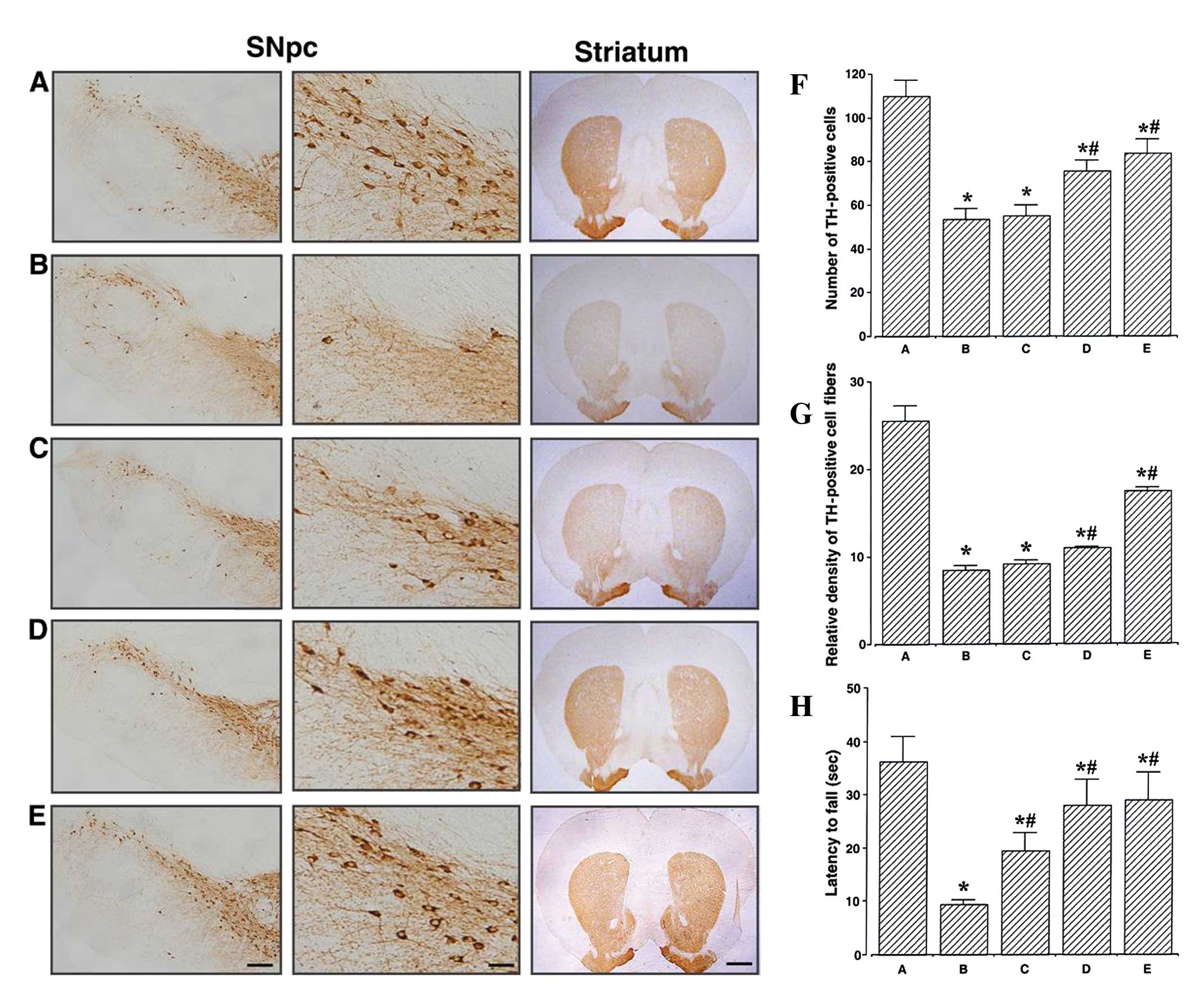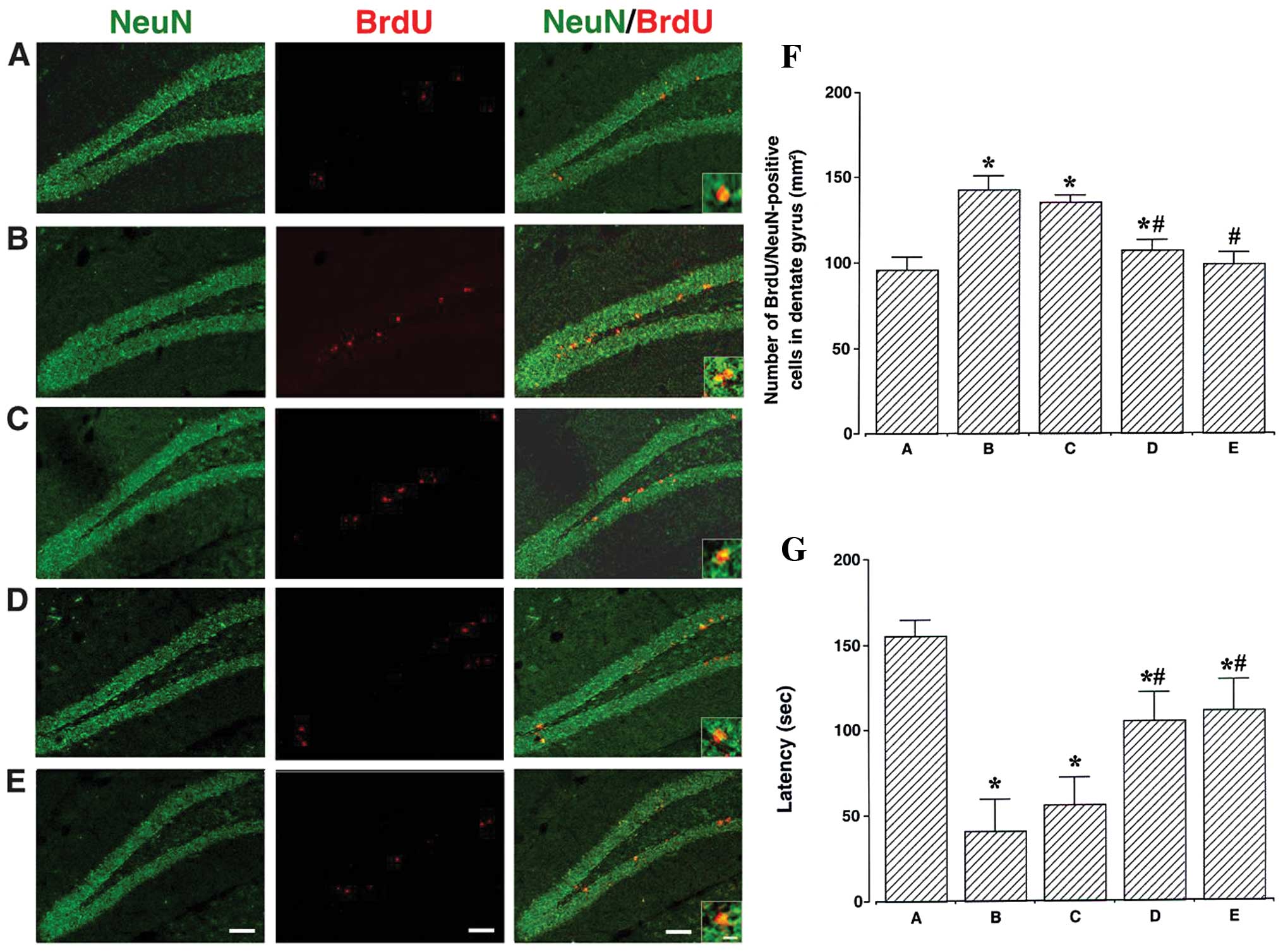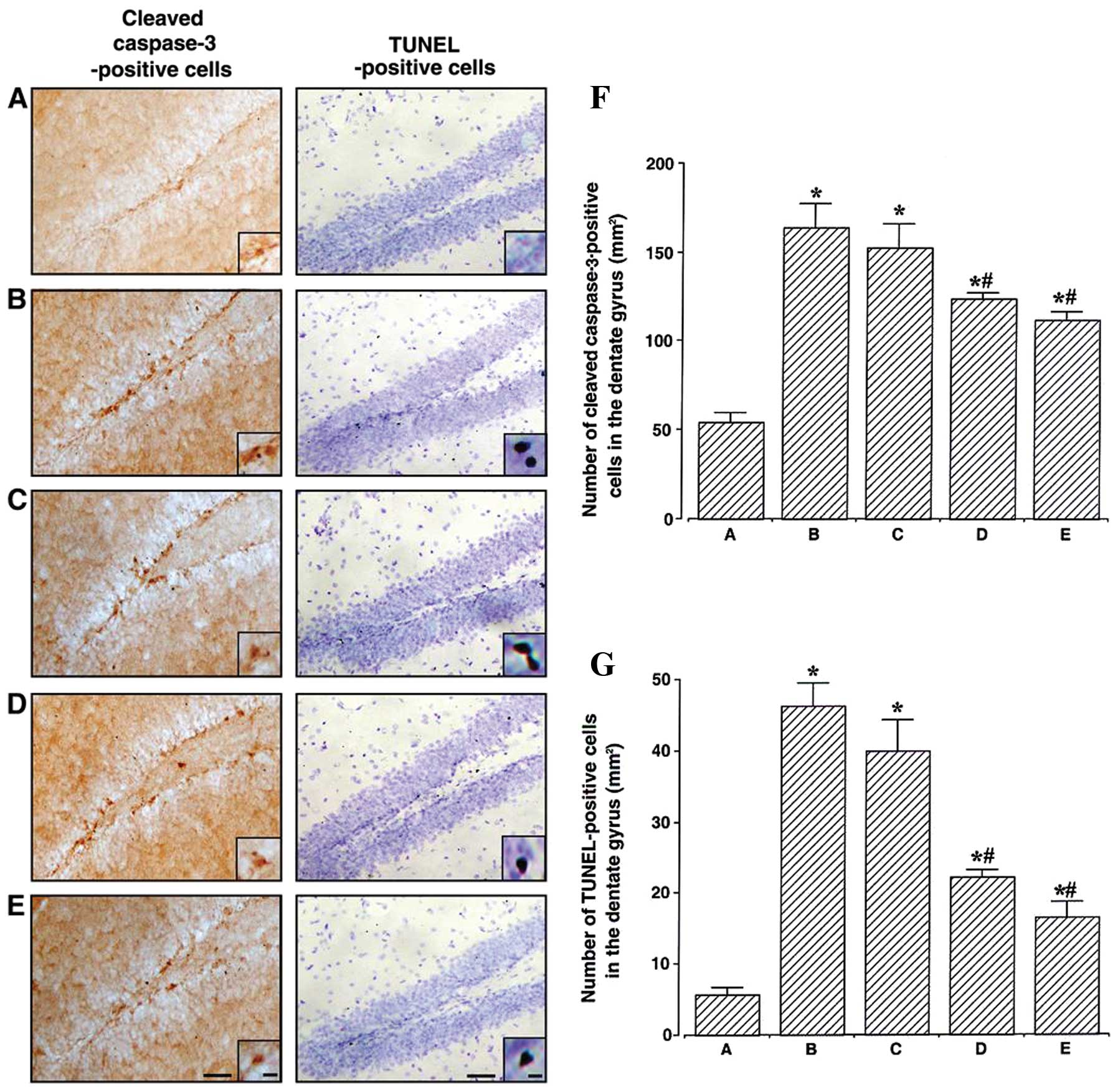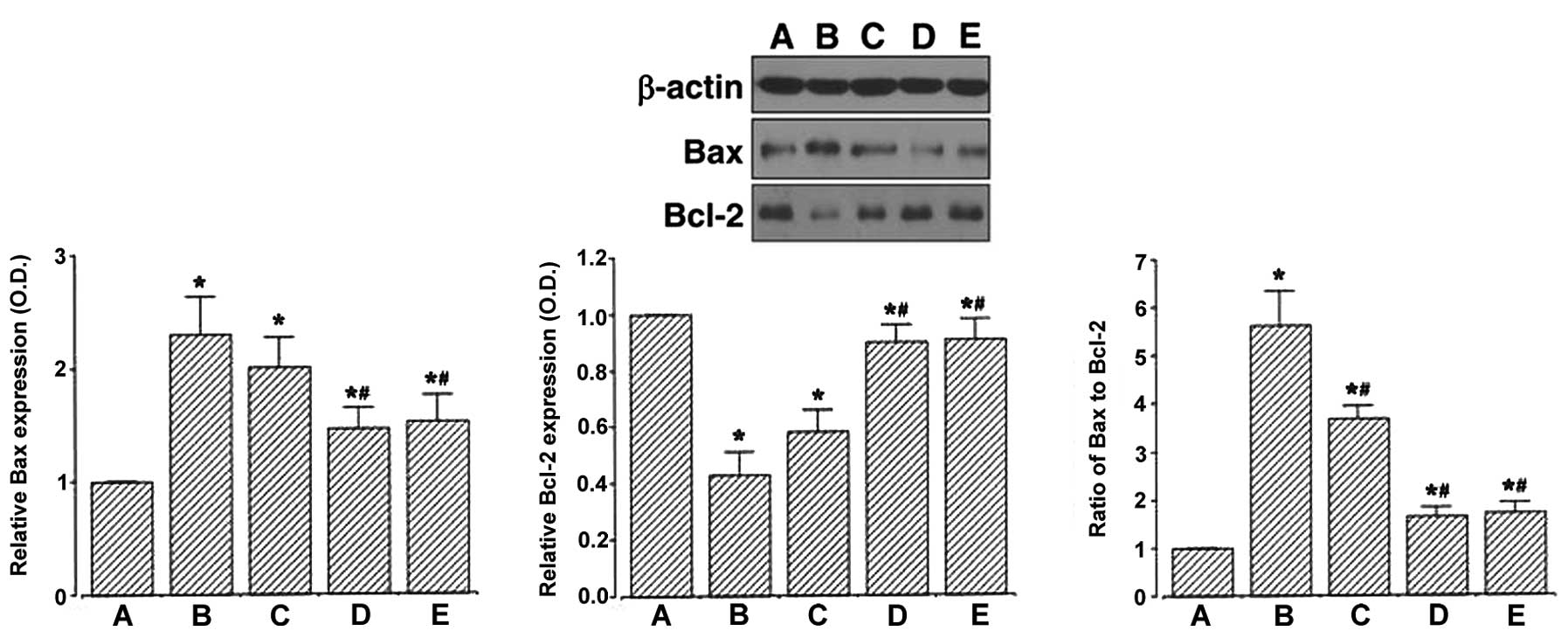|
1
|
Dauer W and Przedborski S: Parkinson’s
disease: Mechanisms and models. Neuron. 39:889–909. 2003.
|
|
2
|
Park JH and Enikolopov G: Transient
elevation of adult hippocampal neurogenesis after dopamine
depletion. Exp Neurol. 222:267–276. 2010. View Article : Google Scholar : PubMed/NCBI
|
|
3
|
Asanuma M, Miyazaki I and Ogawa N:
Dopamine- or L-DOPA-induced neurotoxicity: the role of dopamine
quinone formation and tyrosinase in a model of Parkinson’s disease.
Neurotox Res. 5:165–176. 2003.
|
|
4
|
Sung YH, Kim SC, Hong HP, Park CY, Shin
MS, Kim CJ, Seo JH, Kim DY, Kim DJ and Cho HJ: Treadmill exercise
ameliorates dopaminergic neuronal loss through suppressing
microglial activation in Parkinson’s disease mice. Life Sci.
91:1309–1316. 2012.PubMed/NCBI
|
|
5
|
Yoon MC, Shin MS, Kim TS, Kim BK, Ko IG,
Sung YH, Kim SE, Lee HH, Kim YP and Kim CJ: Treadmill exercise
suppresses nigrostriatal dopaminergic neuronal loss in
6-hydroxydopamine-induced Parkinson’s rats. Neurosci Lett.
423:12–17. 2007.PubMed/NCBI
|
|
6
|
Eriksson PS, Perfilieva E, Bjork-Eriksson
T, Alborn AM, Nordborg C, Peterson DA and Gage FH: Neurogenesis in
the adult human hippocampus. Nat Med. 4:1313–1317. 1998. View Article : Google Scholar : PubMed/NCBI
|
|
7
|
Kempermann G, Jessberger S, Steiner B and
Kronenberg G: Milestones of neuronal development in the adult
hippocampus. Trends Neurosci. 27:447–452. 2004. View Article : Google Scholar : PubMed/NCBI
|
|
8
|
Kim SE, Ko IG, Kim BK, Shin MS, Cho S, Kim
CJ, Kim SH, Baek SS, Lee EK and Jee YS: Treadmill exercise prevents
aging-induced failure of memory through an increase in neurogenesis
and suppression of apoptosis in rat hippocampus. Exp Gerontol.
45:357–365. 2010. View Article : Google Scholar : PubMed/NCBI
|
|
9
|
Shin MS, Ko IG, Kim SE, Kim BK, Kim TS,
Lee SH, Hwang DS, Kim CJ, Park JK and Lim BV: Treadmill exercise
ameliorates symptoms of methimazole-induced hypothyroidism through
enhancing neurogenesis and suppressing apoptosis in the hippocampus
of rat pups. Int J Dev Neurosci. 31:214–223. 2013. View Article : Google Scholar
|
|
10
|
Dash PK, Mach SA and Moore AN: Enhanced
neurogenesis in the rodent hippocampus following traumatic brain
injury. J Neurosci Res. 63:313–319. 2001. View Article : Google Scholar : PubMed/NCBI
|
|
11
|
Felling RJ and Levison SW: Enhanced
neurogenesis following stroke. J Neurosci Res. 73:277–283. 2003.
View Article : Google Scholar : PubMed/NCBI
|
|
12
|
Ma L, Cui XL, Wang Y, Li XW, Yang F, Wei D
and Jiang W: Aspirin attenuates spontaneous recurrent seizures and
inhibits hippocampal neuronal loss, mossy fiber sprouting and
aberrant neurogenesis following pilocarpine-induced status
epilepticus in rats. Brain Res. 21:103–113. 2012. View Article : Google Scholar
|
|
13
|
Hwang L, Choi IY, Kim SE, Ko IG, Shin MS,
Kim CJ, Kim SH, Jin JJ, Chung JY and Yi JW: Dexmedetomidine
ameliorates intracerebral hemorrhage-induced memory impairment by
inhibiting apoptosis and enhancing brain-derived neurotrophic
factor expression in the rat hippocampus. In J Mol Med.
31:1047–1056. 2013.
|
|
14
|
Savitz SI and Rosenbaum DM: Apoptosis in
neurological disease. Neurosurgery. 42:555–574. 1998. View Article : Google Scholar
|
|
15
|
Cohen GM: Caspases: the executioners of
apoptosis. Biochem J. 326:1–16. 1997.
|
|
16
|
Oltvai ZN, Milliman CL and Korsmeyer SJ:
Bcl-2 heterodimerizes in vivo with a conserved homolog, Bax, that
accelerates programmed cell death. Cell. 74:609–619. 1993.
View Article : Google Scholar : PubMed/NCBI
|
|
17
|
Wolf BB, Schuler M, Echeverri F and Green
DR: Caspase-3 is the primary activator of apoptotic DNA
fragmentation via DNA fragmentation factor-45/inhibitor of
caspase-activated DNase inactivation. J Biol Chem. 274:30651–30656.
1999. View Article : Google Scholar : PubMed/NCBI
|
|
18
|
Imanshahidi M and Hosseinzadeh H:
Pharmacological and therapeutic effects of Berberis vulgaris
and its active constituent, berberine. Phytother Res. 22:999–1012.
2008.PubMed/NCBI
|
|
19
|
Kulkarni SK and Dhir A: On the mechanism
of antidepressant-like action of berberine chloride. Eur J
Pharmacol. 589:163–172. 2008. View Article : Google Scholar : PubMed/NCBI
|
|
20
|
Bhutada P, Mundhada Y, Bansod K, Tawari S,
Patil S, Dixit P, Umathe S and Mundhada D: Protection of
cholinergic and antioxidant system contributes to the effect of
berberine ameliorating memory dysfunction in rat model of
streptozotocin-induced diabetes. Behav Brain Res. 220:30–41. 2011.
View Article : Google Scholar
|
|
21
|
Zhu F and Qian C: Berberine chloride can
ameliorate the spatial memory impairment and increase the
expression of interleuin-1beta and inducible nitric oxide synthase
in the rat model of Alzheimer’s disease. BMC Neurosci.
7:782006.PubMed/NCBI
|
|
22
|
Hung TM, Dang NH, Kim JC, Jang HS, Ryoo
SW, Lee JH, Choi JS, Bae K and Min BS: Alkaloids from roots of
Stephania rotunda and their cholinesterase inhibitory
activity. Planta Med. 76:1762–1764. 2010.PubMed/NCBI
|
|
23
|
Zhang Q, Qian Z, Pan L, Li H and Zhu H:
Hypoxia-inducible factor 1 mediates the anti-apoptosis of berberine
in neurons during hypoxia/ischemia. Acta Physiol Hung. 99:311–323.
2012. View Article : Google Scholar : PubMed/NCBI
|
|
24
|
Bae J, Lee D, Kim YK, Gil M, Lee JY and
Lee KJ: Berberine protects 6-hydroxydopamine-induced human
dopaminergic neuronal cell death through the induction of heme
oxygenase-1. Mol Cells. 35:151–157. 2013. View Article : Google Scholar : PubMed/NCBI
|
|
25
|
Kwon IH, Choi HS, Shin KS, Lee BK, Lee CK,
Hwang BY, Lim SC and Lee MK: Effects of berberine on
6-hydroxydopamine-induced neurotoxicity in PC12 cells and a rat
model of Parkinson’s disease. Neurosci Lett. 486:29–33.
2010.PubMed/NCBI
|
|
26
|
Miyoshi E, Wietzikoski S, Camplessei M,
Silveira R, Takahashi RN and Da Cunha C: Impaired learning in a
spatial working memory version and in a cued version of the water
maze in rats with MPTP-induced mesencephalic dopaminergic lesions.
Brain Res Bull. 58:41–47. 2002. View Article : Google Scholar
|
|
27
|
Schneider JS, Tinker JP, VanVelson M and
Giardiniere M: Effects of the partial glycine agonist D-cycloserine
on cognitive functioning in chronic low dose MPTP-treated monkeys.
Brain Res. 860:190–194. 2000. View Article : Google Scholar : PubMed/NCBI
|
|
28
|
Meredith GE, Totterdell S, Potashkin JA
and Surmeier DJ: Modeling PD pathogenesis in mice: advantages of a
chronic MPTP protocol. Parkinsonism Relat Disord. 14(Suppl 2):
S112–S115. 2008. View Article : Google Scholar : PubMed/NCBI
|
|
29
|
Lau YS, Trobough KL, Crampton JM and
Wilson JA: Effects of probenecid on striatal dopamine depletion in
acute and long-term 1-methyl-4-phenyl-1,2,3,6-tetrahydropyridine
(MPTP)-treated mice. Gen Pharmacol. 21:181–187. 1990. View Article : Google Scholar : PubMed/NCBI
|
|
30
|
Meng XH, Liu P, Wang H, Zhao XF, Xu ZM,
Chen GH and Xu DX: Gender-specific impairments on cognitive and
behavioral development in mice exposed to fenvalerate during
puberty. Toxicol Lett. 203:245–251. 2011. View Article : Google Scholar : PubMed/NCBI
|
|
31
|
Nutt JG, Carter JH and Sexton GJ: The
dopamine transporter: importance in Parkinson’s disease. Ann
Neurol. 55:766–773. 2004.
|
|
32
|
Von Bohlen and Halbach O: Modeling
neurodegenerative diseases in vivo review. Neurodegener Dis.
2:313–320. 2005.
|
|
33
|
Schintu N, Frau L, Ibba M, Garau A,
Carboni E and Carta AR: Progressive dopaminergic degeneration in
the chronic MPTPp mouse model of Parkinson’s disease. Neurotox Res.
16:127–139. 2009.
|
|
34
|
Emre M: Dementia associated with
Parkinson’s disease. Lancet Neurol. 2:229–237. 2003.
|
|
35
|
Ho YJ, Ho SC, Pawlak CR and Yeh KY:
Effects of D-cycloserine on MPTP-induced behavioral and
neurological changes: potential for treatment of Parkinson’s
disease dementia. Behav Brain Res. 219:280–290. 2011.PubMed/NCBI
|
|
36
|
Peng J, Xie L, Jin K, Greenberg DA and
Andersen JK: Fibroblast growth factor 2 enhances striatal and
nigral neurogenesis in the acute
1-methyl-4-phenyl-1,2,3,6-tetrahydropyridine model of Parkinson’s
disease. Neuroscience. 153:664–570. 2008.PubMed/NCBI
|
|
37
|
Kim SE, Ko IG, Park CY, Shin MS, Kim CJ
and Jee YS: Treadmill and wheel exercise alleviate
lipopolysaccharide-induced short-term memory impairment by
enhancing neuronal maturation in rats. Mol Med Rep. 7:31–36.
2013.PubMed/NCBI
|
|
38
|
Lesemann A, Reinel C, Hühnchen P,
Pilhatsch M, Hellweg R, Klaissle P, Winter C and Steiner B:
MPTP-induced hippocampal effects on serotonin, dopamine,
neurotrophins, adult neurogenesis and depression-like behavior are
partially influenced by fluoxetine in adult mice. Brain Res.
1457:51–69. 2012. View Article : Google Scholar : PubMed/NCBI
|
|
39
|
Parent JM: Injury-induced neurogenesis in
the adult mammalian brain. Neuroscientist. 9:261–272. 2003.
View Article : Google Scholar : PubMed/NCBI
|
|
40
|
Liedhegner EA, Steller KM and Mieyal JJ:
Levodopa activates apoptosis signaling kinase 1 (ASK1) and promotes
apoptosis in a neuronal model: implications for the treatment of
Parkinson’s disease. Chem Res Toxicol. 24:1644–1652.
2011.PubMed/NCBI
|
|
41
|
Elmore S: Apoptosis: a review of
programmed cell death. Toxicol Pathol. 35:495–516. 2007. View Article : Google Scholar : PubMed/NCBI
|
|
42
|
Zhou XQ, Zeng XN, Kong H and Sun XL:
Neuroprotective effects of berberine on stroke models in vitro and
in vivo. Neurosci Lett. 447:31–36. 2008. View Article : Google Scholar : PubMed/NCBI
|


















